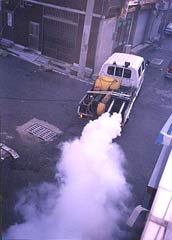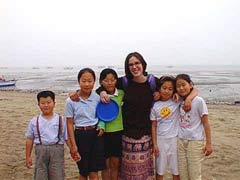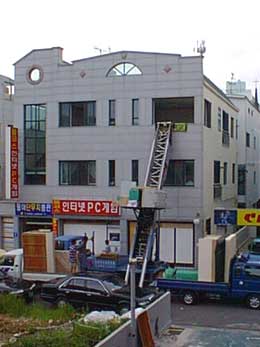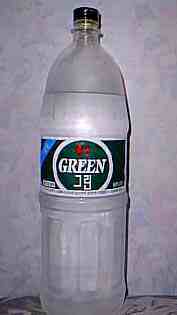
the only good mosquito is a DEAD mosquito
| Never saw this one in New York, though we've heard they do have its like elsewhere in the USA... Come summertime, the mosquitos here are big and nasty. These trucks (or sometimes motorcycles) will make a pass down your block several times a week, pumping out huge clouds of this mosquito-killing smoke. Kids run and dance around in the fog or follow on bicycles, coating themselves with repellant so they can play outside all day. Photo courtesy of our colleague Mike Walmsley--thanks! |  |
steady, now...
 |
In a country that has made an incredibly determined, fast, and successful effort to modernize in the last 50 years, sometimes it's a really amusing sight to find those folks who stick to the old ways. Rob was walking around downtown Kyeongju city with Gadi and Leah during their July 2000 visit when they all spotted this guy working on power lines, supported by a short bamboo ladder and another guy to hold the rope. |
losing your religion?
| These days, Korea has a fairly even mix of Buddhist, Christian, and nonreligious folks in its population of over 40 million. It's just that here, it seems that most of the Christians are especially, um, eager. To be honest, sometimes they're even a bit aggressive. Of course, you can see that all the time in the West, but it's a little bit unusual to accept in a country that was once overwhelmingly Buddhist. |  |
instant friends
 |
One major culture shock over here is the way people--especially kids and teenagers--can sometimes stare endlessly at you, or shout "hello" and giggle obnoxiously. However, even more surprising, and rewarding, is just how warmly some people greet you. We arrived in the tiny seaside town of Yulpo one day, only to find miserably gray weather and nothing much to do there. Within minutes, a group of kids latched onto us, following us everywhere as we checked out the town. We soon found out that they weren't trying to annoy us and were really interested in talking to us with the tiny bit of English they'd studied in school--since we were the first foreigners they had ever seen in person! They showed us around their little village, drew pictures and tossed the frisbee with us, and were genuinely heartbroken when we had to leave. Though the weather was too nasty to take many pictures that day, we couldn't leave without taking this one of our little fan club. |
moving in
 |
Like a lot of other Asian countries, Korea has a definite shortage of liveable space. As a result, high-rise apartment buildings are the most popular living quarters. Even small apartment buildings, like the one pictured at left, are usually crammed into a tiny vacant lot, built with little room on the stairwells and no elevator at all--let alone a freight elevator. That's why Koreans use these massive, traffic-blocking, noise-making, platform elevator trucks to get the furniture (and most everything else) into a new apartment. |
dining out
Korean food is really good, so it's not too appropriate to call our adjustment to it "culture shock," but the style of dining is so different that it warranted a description and picture on this page...

Tending the Dwae-chi Kalbi (marinated pork ribs).
Meat dishes, stews, soups, whatever, are usually cooked right at your table on a small coal barbecue or gas burner. While you cook the main dish, you pick at any of the 6-12 side dishes served, which are usually vegetables in loads of red pepper paste or a little sesame oil. If you're cooking meat: when it's done, hold a big lettuce leaf in your palm and put in some meat with a little soybean paste, garlic, or bits of the side dishes. Then wrap it all up and shove the whole thing in your mouth. Mmmmm.
Rice is a major staple here, as in most Asian countries, and the "national food" is kimchi--that's pickled cabbage with tons of garlic and red pepper. Doesn't sound appetizing to you? It's delicious and highly addictive. Although cabbage is the "classic" type of kimchi, the same pickling and spicing process is followed for dozens of other vegetables too, and most of them are really tasty.
Some of the dishes do lean toward the exotic. We've had cow intestines stuffed with other guts (soondae), pressed pig head, a few squid and octopus dishes, and other curious foods. We haven't tried po'shin tahng yet; that's dog meat stew. We'd like to know: Would you eat it?
Konglish spoken here
It didn't take us long to learn the term "Konglish," which refers to the sometimes charming, sometimes alarming mistakes made by Korean speakers of English. Many Korean companies like to use some English marketing language on their product labels, but sometimes Konglish takes over. Here's one of our favorites. Ponder:
|
 |
lesson one
|
Guessing game: what's this?
|
On our first shopping trip (on our third day here), Rob chose the first option from the above list: bottled water, no question. We bought two very large bottles.
That night, Cheris finally opened one and took a sip. "Woah!" she exclaimed, "Rob, this is vodka!" Rob tasted it and couldn't really disagree, until he spotted a "25%" on the cap. If that was the alcohol level, it couldn't be vodka...We opened up one of our books on Korean culture and looked up "alcohol" in the index. Very soon we'd learned that we'd purchased soju, a Korean favorite that's made from potatoes. It tastes distinctly like vodka, though it has considerably less alcohol.
No harm done... our faces were a tad red, and we had an enormous amount of alcohol on hand. So we got stinking drunk and toasted the many other cultural mysteries, slip-ups, and freakouts that await us. And of course, you'll hear about them all right here.
